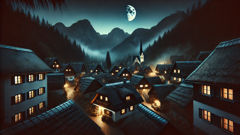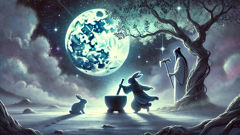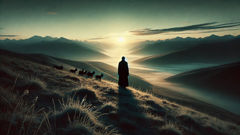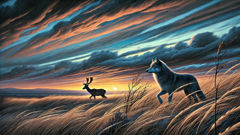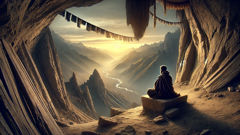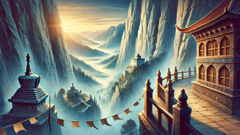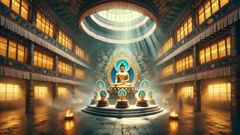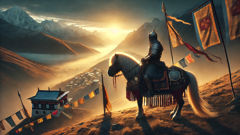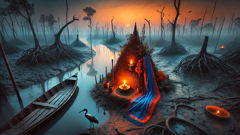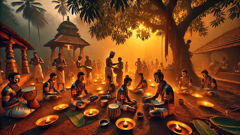Introduction
The wind howled down from the crags, threading through the pitch-black firs that clustered on the slopes of the Bavarian Alps. Under the waning crescent moon, the village of Steinbach huddled against the darkness, its thatched rooftops and cobbled lanes half-swallowed by creeping mist. In this remote and superstitious corner of medieval Germany, every shadow seemed to move with purpose and every silence throbbed with unspoken fear. The villagers lived by old rules, whispering prayers at sundown and hanging sprigs of wolfsbane above their doors, ever wary of what might slink out of the woods as the world drifted into slumber. Yet not even their most timeworn charms protected them from what haunted their nights: the Alp, a goblin-like creature said to slip into homes beneath the cloak of night, perching atop chests and suffocating sleepers with its weight. For generations, stories of the Alp had been passed around flickering hearths, tales of men and women who awoke gasping for breath, their bodies paralyzed and their minds wracked by visions of terror. Some claimed to see the creature itself—a hunched, shadowy figure with gleaming eyes, pointed hat, and a cruel, knowing smile. Others found only evidence: tangled bedclothes, unexplained bruises, or a lingering sense of dread that clung to them like a second skin. In Steinbach, the legend was no idle fancy. Nightmares came like plagues, and those afflicted grew pale and hollow-eyed, their strength sapped as if some phantom thief had drained them in their sleep. It was into this realm of shivering fear that a young woman named Greta was born, her fate entwined with the Alp in ways she could never have imagined. As winter deepened and the nights stretched long, the old stories would take on new life, and the boundaries between legend and reality would blur beneath the shadow of the mountains.
Whispers in the Night
Greta’s earliest memory was of her mother humming softly by candlelight, the scent of beeswax and pine resin thick in their modest cottage. Her father, a broad-shouldered woodsman, often returned from the forest with arms full of timber and tales of the spirits that lived among the trees. Greta listened wide-eyed, her imagination kindled by the mysteries that seemed to pulse just beyond the reach of the hearth’s glow.
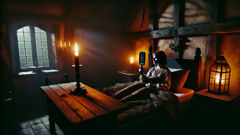
As the years passed, fear became a constant companion in Steinbach. Children vanished into feverish nightmares, and grown men confessed to feeling unseen hands pressing down upon them in the dark. The village priest, Father Anselm, held extra vigils, his weary face pale above flickering candles as he recited prayers to ward off evil. But the Alp’s shadow only grew longer, stalking not just their sleep but their waking hours.
One bitter winter night, Greta’s younger brother Lukas was stricken. He awoke screaming, drenched in sweat and unable to move, his eyes wild with terror. Their mother found him clawing at his chest, as if trying to dislodge some invisible weight. The family huddled together for comfort, but Lukas’ strength waned with each passing night. He grew listless, haunted by dreams of a hunched figure with burning eyes that whispered his name from the foot of the bed.
It was then that Greta, always curious and fiercely protective, resolved to seek the truth behind the legend. She questioned the elders, pored over her grandmother’s tattered grimoire, and listened to the ramblings of the oldest widow in the village, Frau Reinhild. The old woman’s stories were thick with superstition: the Alp could slip through the tiniest cracks, she said, and feared only iron, fire, and a mirror turned toward its face. It loved to torment, feeding on fear and despair, but it could be banished if one possessed the courage to confront it directly.
Skepticism warred with dread in Greta’s heart, but her brother’s suffering left her no choice. Armed with a silvered hand mirror, an iron nail, and a pouch of wolfsbane, she prepared to face whatever haunted their home. That night, she feigned sleep as the household settled, her ears straining for the telltale signs of the Alp’s arrival. The air grew cold and heavy, pressing against her chest like a stone. Shadows gathered in the corners of the room, swirling and coalescing into something darker still. And then—she felt it: a weight, slight at first, then crushing. Panic seized her, but Greta forced herself to remain still, her hand inching toward the mirror beneath her pillow. In the blackness, she sensed movement atop her chest—a presence both real and unreal, foul breath hot on her cheek. With a surge of courage, she flung the mirror upward, catching a glimpse of gleaming eyes and a twisted grin before the Alp shrieked and vanished in a puff of icy wind.
Lukas’s nightmares eased for a time, but the Alp’s mark lingered in the village. Others fell ill, some never waking from their haunted slumber. Rumors spread that the Alp was angered, seeking revenge for being driven off. It stalked the woods, its form glimpsed in moonlit clearings or crouched among the gravestones at the edge of town. Greta felt its gaze follow her, a prickling at the nape of her neck wherever she went.
Yet she would not yield. Instead, she gathered her courage and knowledge, determined to put an end to the Alp’s reign of terror. Alongside a handful of brave villagers—Father Anselm, the kindly blacksmith Herr Dieter, and her childhood friend Matthias—Greta set out to uncover the Alp’s origins and find a way to banish it for good. Their quest would lead them deep into the heart of the mountains, where ancient secrets slumbered and the boundaries between this world and the next grew thin.
The Descent into Darkness
Their journey began with offerings and prayers at the edge of the forest, every villager aware that crossing into the deep woods at night risked more than lost bearings. The Bavarian Alps loomed overhead, their snowy peaks glinting under a pale sun. Greta felt the ancient presence of the land—its old magic and old fears—thick as moss beneath her boots.
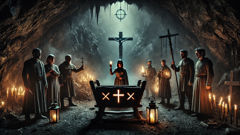
They trekked through frost-laden trees, past frozen streams and silent glades where no birds sang. Father Anselm carried his crucifix and a vial of holy water; Dieter bore an iron hammer; Matthias brought his grandfather’s lantern and a heart full of uneasy loyalty. Greta clutched her pouch of wolfsbane and her battered grimoire, sensing that both faith and folklore would be needed to survive.
The group soon found evidence of the Alp’s passing: claw marks on tree trunks, small hoofprints in patches of snow, and circles of scorched earth where nothing grew. At dusk, they stumbled upon a ruined shrine nestled in a rocky hollow—an altar blackened by old fire, its stones carved with runes and warnings in a language none could read. An uneasy hush fell as Father Anselm traced the markings. 'This is older than the Church,' he murmured. 'A place of sacrifice.'
That night, as they camped by the flickering light of Dieter’s fire, Greta dreamed of the Alp. In her vision, she wandered a labyrinth of twisted corridors, each lined with faceless villagers moaning in torment. The Alp stalked her from the shadows, its voice oily and persuasive. 'Why fight me, Greta?' it whispered. 'Your fear is sweet.' She awoke trembling, feeling the weight of unseen eyes.
The next morning, Matthias confessed to hearing footsteps circling the camp. Dieter found his tools scattered, their iron edges dulled as if by acid. The group pressed on, nerves fraying. They descended into a ravine choked with brambles and mist, where ancient stones jutted like broken teeth and silence pressed in from all sides. Here, Frau Reinhild’s warnings echoed in Greta’s mind: the Alp was born from grief and wickedness—a creature formed in the wake of violence or betrayal, cursed to wander the night until appeased or destroyed.
As dusk fell on the third day, they reached a cave mouth gaping in the mountainside. The air grew colder still, the light fading to a sickly gray. At the threshold, Matthias hesitated, but Greta led the way. Inside, the darkness was absolute, swallowing the lantern’s glow. The cave walls were slick with condensation, every drip echoing like a heartbeat. Deeper still, they found a crude nest of bones and scraps—a lair, unmistakably, and at its center a battered wooden cradle with strange runes carved along its sides.
Father Anselm recognized the script as a twisted form of Latin: 'He who is consumed by sorrow shall haunt the sleep of others.' Greta pieced together the truth from her grandmother’s stories—the first Alp had once been a grieving man, wronged and cast out, his pain twisting him into a monster. The cradle was both prison and anchor, a relic that tethered the Alp to this world.
But as they pondered what to do, a sudden chill swept through the cavern. Shadows danced and thickened, coalescing into the Alp itself. Its eyes glowed like embers in the dark, its laughter scraping at the edges of sanity. 'You seek to end me?' it jeered. 'You cannot banish what you cannot understand.'
A battle of wills began. The Alp lunged at Dieter, who swung his iron hammer to little effect. Father Anselm brandished his crucifix, chanting prayers that faltered in the cold air. Matthias held the lantern high, casting trembling shadows along the walls. Greta, heart pounding, stepped forward with her mirror and wolfsbane. The Alp recoiled from its own reflection but countered with a blast of freezing wind, snuffing out the lantern and plunging them into darkness.
In that suffocating void, Greta remembered the tales: the Alp was bound by sorrow. Summoning all her courage, she spoke to it—not as a monster, but as a lost soul. She recited prayers for the dead, offered forgiveness for ancient wrongs, and pressed the iron nail into the cradle’s runes. The Alp screamed, its form unraveling as if made of smoke. With a final, keening wail, it vanished into the ether, leaving only silence and the faint scent of violets in its wake.
The group staggered out into the predawn light, shaken but alive. Greta felt the Alp’s curse lift from her shoulders, and for the first time in years, hope dawned over Steinbach.
Conclusion
Long after the confrontation in the mountains, the villagers of Steinbach spoke in hushed tones about that winter—how courage and compassion had driven away the darkness. Greta’s name became entwined with the legend, not as a victim but as a healer who saw through fear to the wounded heart beneath. Though nightmares still came on occasion, they no longer ruled the village; old superstitions faded, replaced by a cautious hope. The Alp’s lair was sealed and consecrated, its cradle buried beneath iron and stone, and each spring the villagers gathered there to remember what had been lost—and what had been saved. In the years that followed, Greta became a wise woman and storyteller, weaving lessons of empathy and strength into every tale she told. The legend of the Alp endured, but it changed: no longer just a warning about evil lurking in the night, but a reminder that even ancient shadows can be dispelled by those brave enough to face them with open eyes and steadfast hearts.

